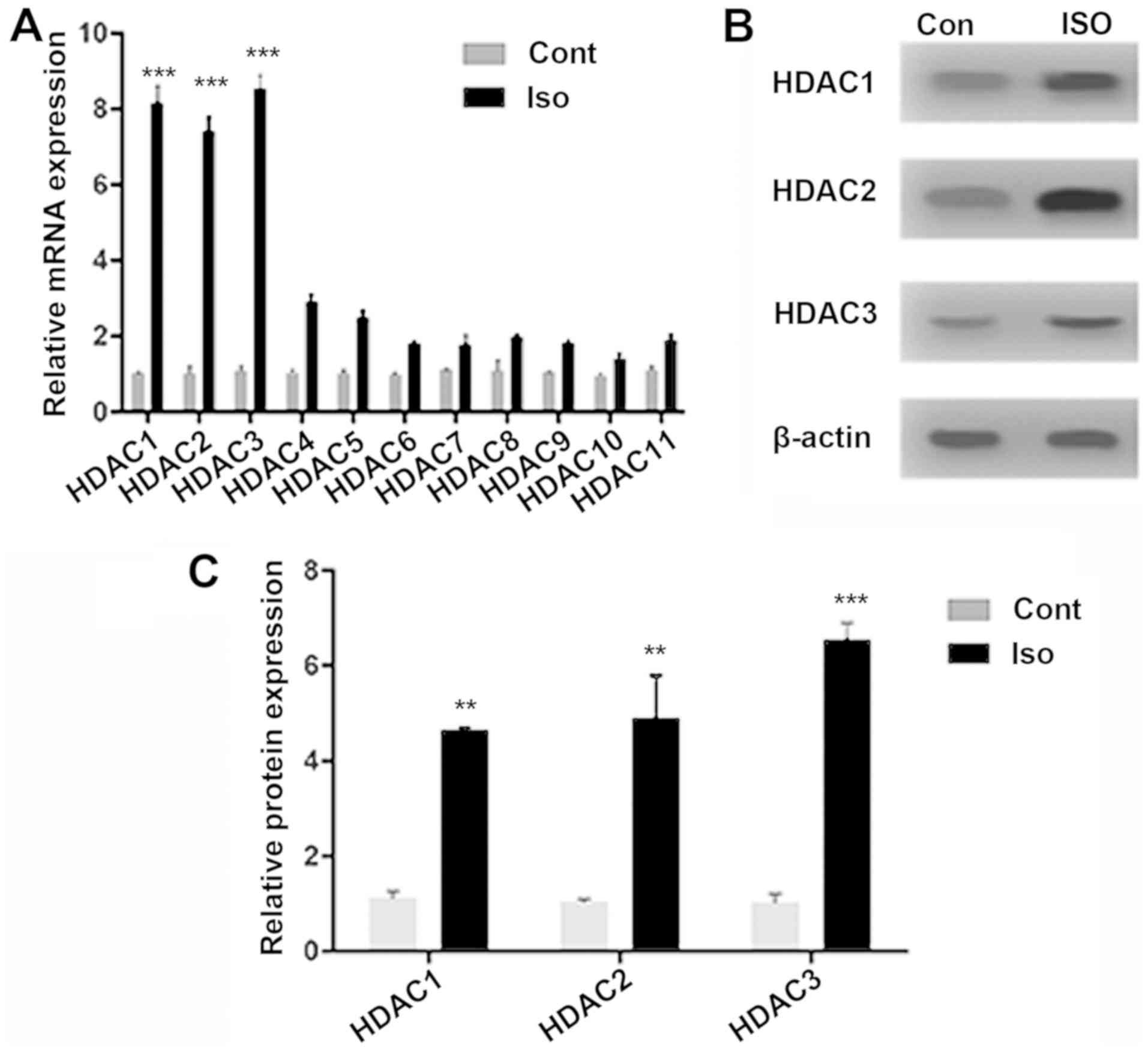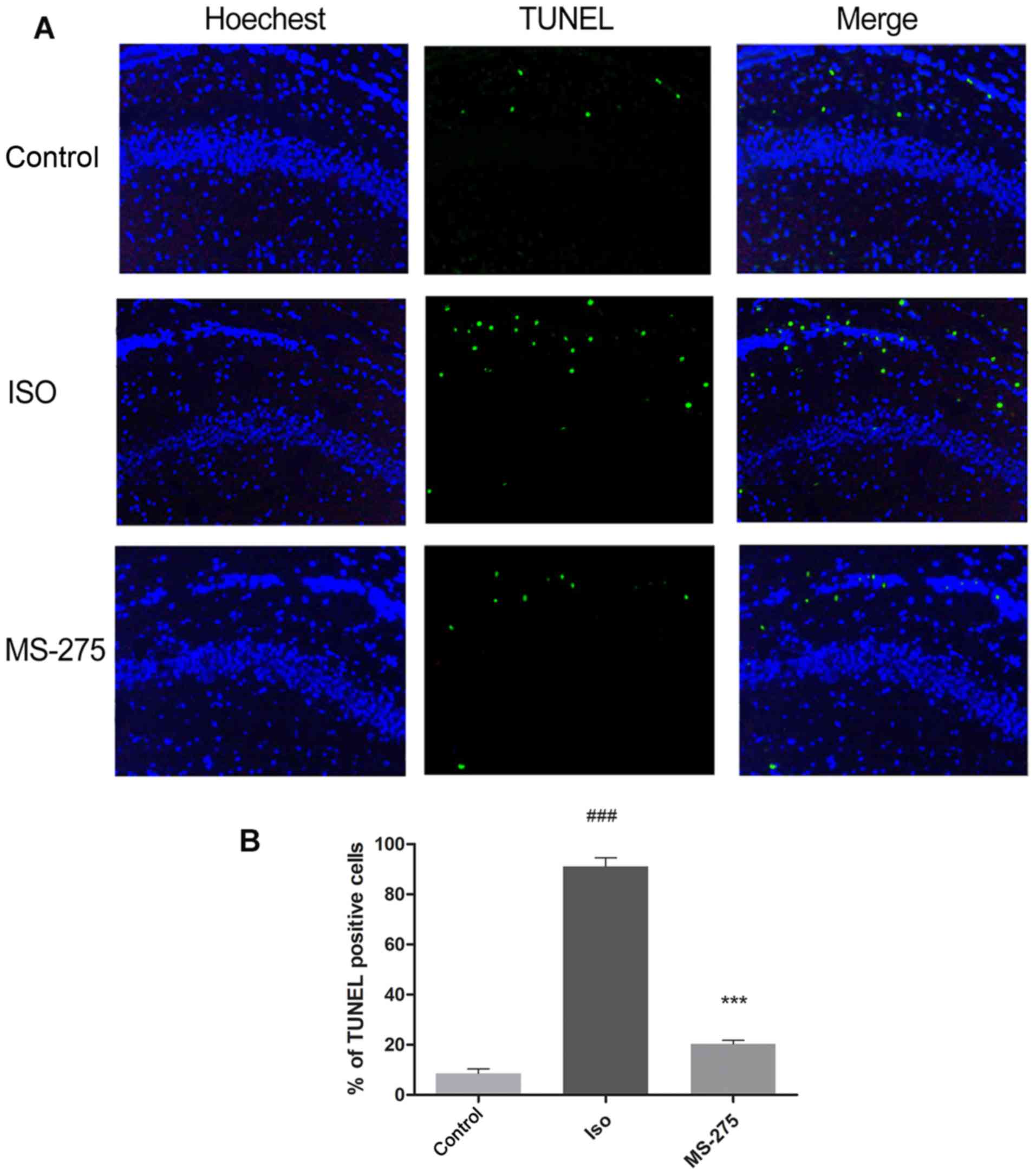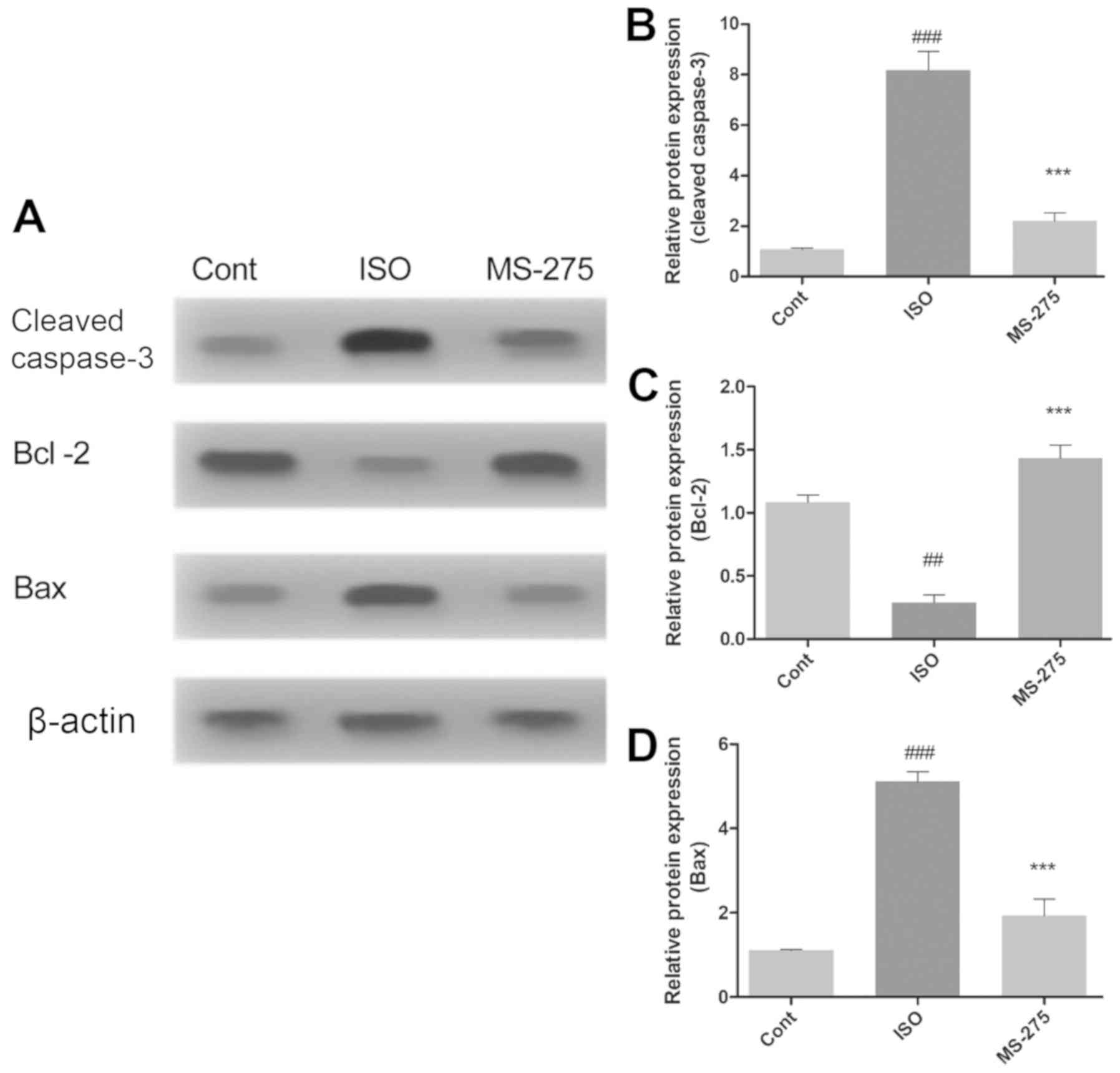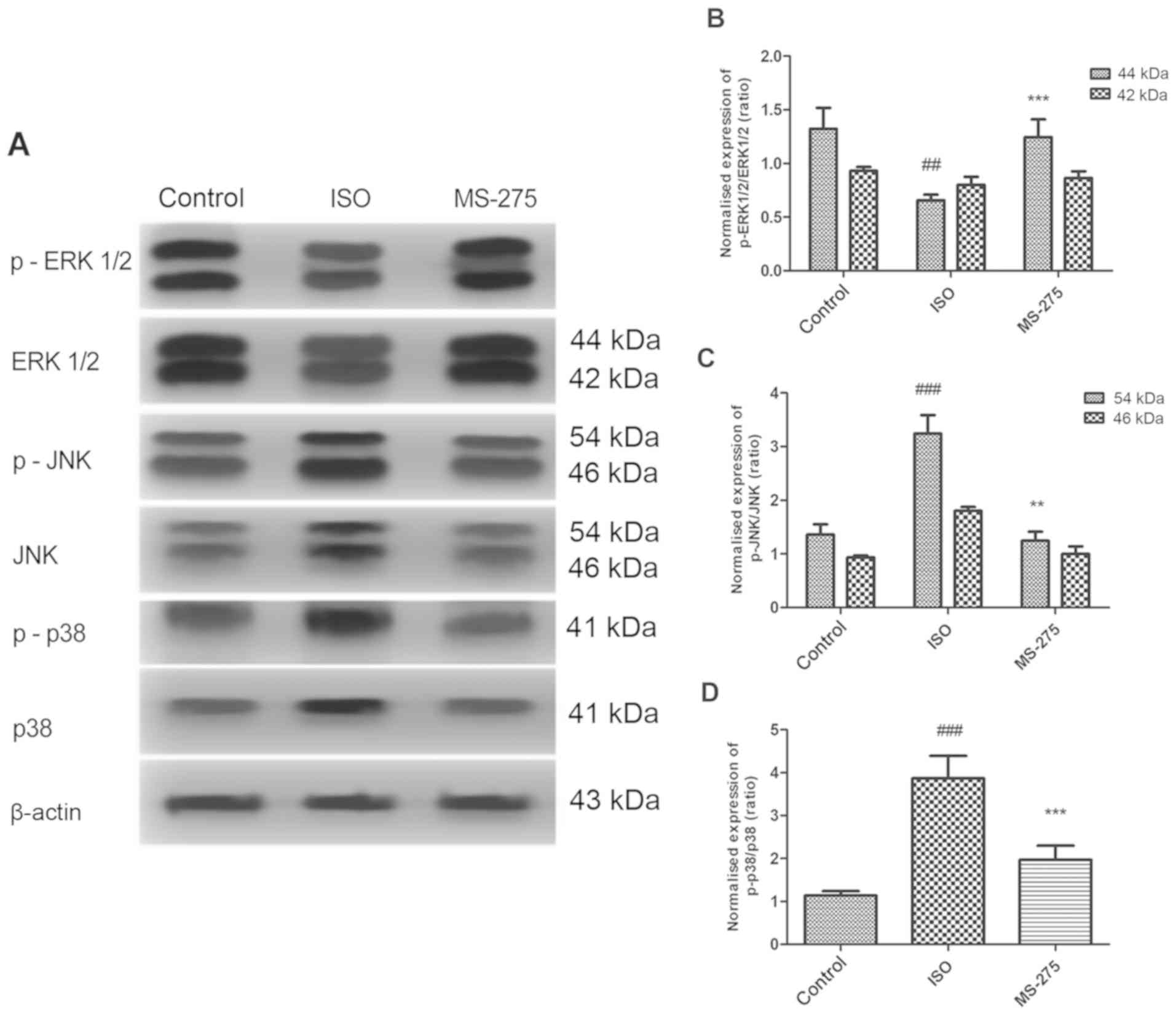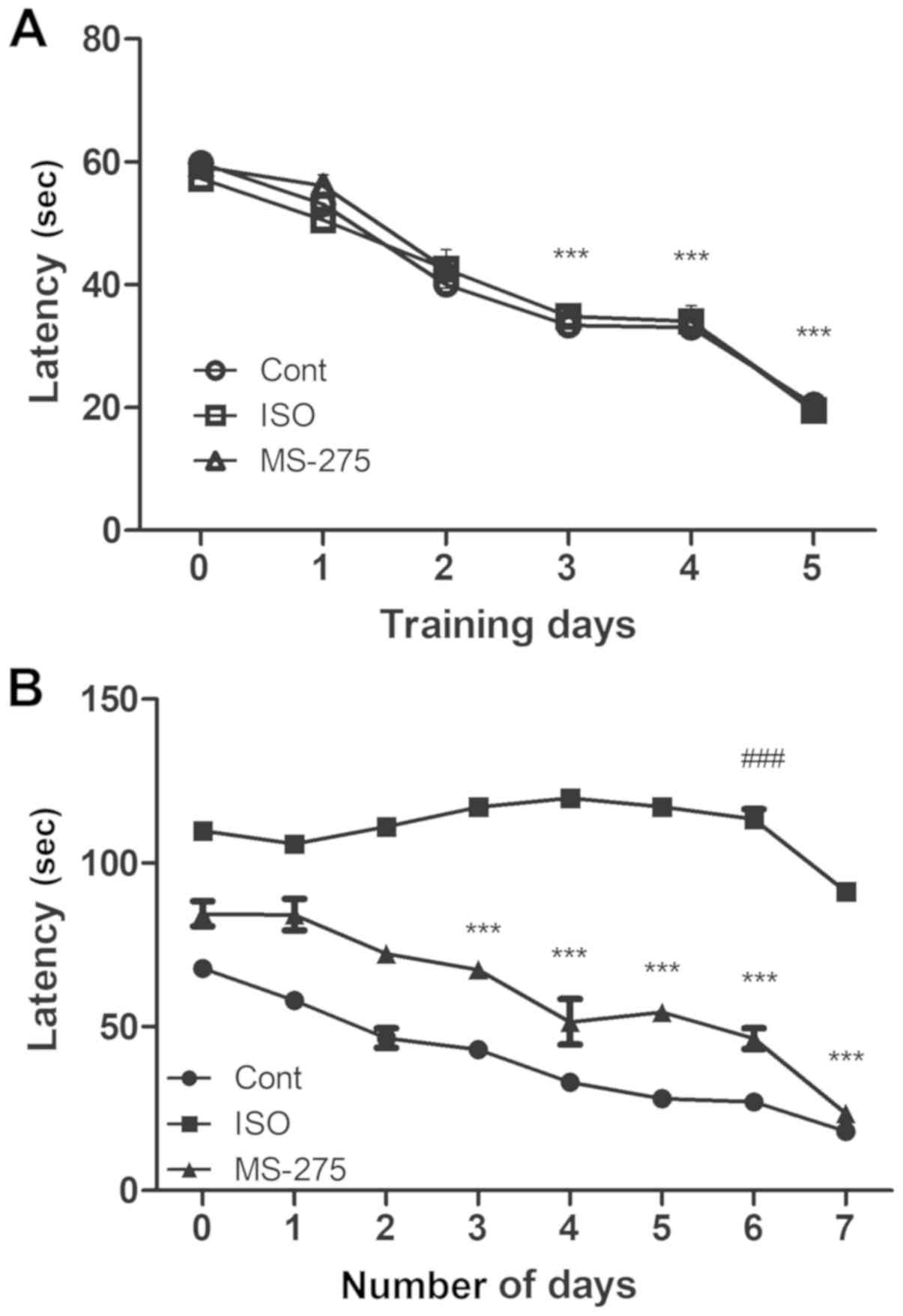|
1
|
Zhang B, Tian M, Zhen Y, Yue Y, Sherman J,
Zheng H, Li S, Tanzi RE, Marcantonio ER and Xie Z: The effects of
isoflurane and desflurane on cognitive function in humans. Anesth
Analg. 114:410–415. 2012.PubMed/NCBI View Article : Google Scholar
|
|
2
|
Kong F, Chen S, Cheng Y, Ma L, Lu H, Zhang
H and Hu W: Minocycline attenuates cognitive impairment induced by
isoflurane anesthesia in aged rats. PLoS One.
8(e61385)2013.PubMed/NCBI View Article : Google Scholar
|
|
3
|
Lin D and Zuo Z: Isoflurane induces
hippocampal cell injury and cognitive impairments in adult rats.
Neuropharmacology. 61:1354–1359. 2011.PubMed/NCBI View Article : Google Scholar
|
|
4
|
Cao Y, Li Z, Ma L, Ni C, Li L, Yang N, Shi
C and Guo X: Isoflurane-induced postoperative cognitive dysfunction
is mediated by hypoxia-inducible factor-1α-dependent
neuroinflammation in aged rats. Mol Med Rep. 17:7730–7736.
2018.PubMed/NCBI View Article : Google Scholar
|
|
5
|
Zhang S, Hu X, Guan W, Luan L, Li B, Tang
Q and Fan H: Isoflurane anesthesia promotes cognitive impairment by
inducing expression of β-amyloid protein-related factors in the
hippocampus of aged rats. PLoS One. 12(e0175654)2017.PubMed/NCBI View Article : Google Scholar
|
|
6
|
Zhang TY and Meaney MJ: Epigenetics and
the environmental regulation of the genome and its function. Annu
Rev Psychol. 61:439–466, C1-C3. 2010.PubMed/NCBI View Article : Google Scholar
|
|
7
|
Zovkic IB, Guzman-Karlsson MC and Sweatt
JD: Epigenetic regulation of memory formation and maintenance.
Learn Mem. 20:61–74. 2013.PubMed/NCBI View Article : Google Scholar
|
|
8
|
Kim S and Kaang BK: Epigenetic regulation
and chromatin remodeling in learning and memory. Exp Mol Med.
49(e281)2017.PubMed/NCBI View Article : Google Scholar
|
|
9
|
Peleg S, Sananbenesi F, Zovoilis A,
Burkhardt S, Bahari-Javan S, Agis-Balboa RC, Cota P, Wittnam JL,
Gogol-Doering A, Opitz L, et al: Altered histone acetylation is
associated with age-dependent memory impairment in mice. Science.
328:753–756. 2010.PubMed/NCBI View Article : Google Scholar
|
|
10
|
Peixoto L and Abel T: The role of histone
acetylation in memory formation and cognitive impairments.
Neuropsychopharmacology. 38:62–76. 2013.PubMed/NCBI View Article : Google Scholar
|
|
11
|
MacDonald JL and Roskams AJ: Epigenetic
regulation of nervous system development by DNA methylation and
histone deacetylation. Prog Neurobiol. 88:170–183. 2009.PubMed/NCBI View Article : Google Scholar
|
|
12
|
Sun J, Sun J, Ming GL and Song H:
Epigenetic regulation of neurogenesis in the adult mammalian brain.
Eur J Neurosci. 33:1087–1093. 2011.PubMed/NCBI View Article : Google Scholar
|
|
13
|
Hsieh J and Eisch AJ: Epigenetics,
hippocampal neurogenesis, and neuropsychiatric disorders:
Unraveling the genome to understand the mind. Neurobiol Dis.
39:73–84. 2010.PubMed/NCBI View Article : Google Scholar
|
|
14
|
Simonini MV, Camargo LM, Dong E, Maloku E,
Veldic M, Costa E and Guidotti A: The benzamide MS-275 is a potent,
long-lasting brain region-selective inhibitor of histone
deacetylases. Proc Natl Acad Sci USA. 103:1587–1592.
2006.PubMed/NCBI View Article : Google Scholar
|
|
15
|
Mousa A and Bakhiet M: Role of cytokine
signaling during nervous system development. Int J Mol Sci.
14:13931–13957. 2013.PubMed/NCBI View Article : Google Scholar
|
|
16
|
Thomas GM and Huganir RL: MAPK cascade
signalling and synaptic plasticity. Nat Rev Neurosci. 5:173–183.
2004.PubMed/NCBI View
Article : Google Scholar
|
|
17
|
Peng S, Zhang Y, Zhang J, Wang H and Ren
B: ERK in learning and memory: A review of recent research. Int J
Mol Sci. 11:222–232. 2010.PubMed/NCBI View Article : Google Scholar
|
|
18
|
Sharma SK and Carew TJ: The roles of MAPK
cascades in synaptic plasticity and memory in Aplysia: Facilitatory
effects and inhibitory constraints. Learn Mem. 11:373–378.
2004.PubMed/NCBI View
Article : Google Scholar
|
|
19
|
Wang WY, Yang R, Hu SF, Wang H, Ma ZW and
Lu Y: N-stearoyl-L-tyrosine ameliorates sevoflurane induced
neuroapoptosis via MEK/ERK1/2 MAPK signaling pathway in the
developing brain. Neurosci Lett. 541:167–172. 2013.PubMed/NCBI View Article : Google Scholar
|
|
20
|
Bi C, Cai Q, Shan Y, Yang F, Sun S, Wu X
and Liu H: Sevoflurane induces neurotoxicity in the developing rat
hippocampus by upregulating connexin 43 via the JNK/c-Jun/AP-1
pathway. Biomed Pharmacother. 108:1469–1476. 2018.PubMed/NCBI View Article : Google Scholar
|
|
21
|
Ji M, Dong L, Jia M, Liu W, Zhang M, Ju L
and Yang J, Xie Z and Yang J: Epigenetic enhancement of
brain-derived neurotrophic factor signaling pathway improves
cognitive impairments induced by isoflurane exposure in aged rats.
Mol Neurobiol. 50:937–944. 2014.PubMed/NCBI View Article : Google Scholar
|
|
22
|
AVMA Guidelines for the Euthanasia of
Animals: Edition. American Veterinary Medical Association, 2013.
https://www.avma.org/resources-tools/avma-policies/avma-guidelines-euthanasia-animals.
|
|
23
|
Livak KJ and Schmittgen TD: Analysis of
relative gene expression data using real-time quantitative PCR and
the 2(-Δ Δ C(T)) Method. Methods. 25:402–408. 2001.PubMed/NCBI View Article : Google Scholar
|
|
24
|
Vorhees CV and Williams MT: Assessing
spatial learning and memory in rodents. ILAR J. 55:310–332.
2014.PubMed/NCBI View Article : Google Scholar
|
|
25
|
Chakrabarti A, Oehme I, Witt O, Oliveira
G, Sippl W, Romier C, Pierce RJ and Jung M: HDAC8: A multifaceted
target for therapeutic interventions. Trends Pharmacol Sci.
36:481–492. 2015.PubMed/NCBI View Article : Google Scholar
|
|
26
|
Guo X, Ruan H, Li X, Qin L, Tao Y, Qi X,
Gao J, Gan L, Duan S and Shen W: Subcellular Localization of Class
I Histone Deacetylases in the Developing Xenopus tectum.
Front Cell Neurosci. 9(510)2016.PubMed/NCBI View Article : Google Scholar
|
|
27
|
Ma K, Qin L, Matas E, Duffney LJ, Liu A
and Yan Z: Histone deacetylase inhibitor MS-275 restores social and
synaptic function in a Shank3-deficient mouse model of autism.
Neuropsychopharmacology. 43:1779–1788. 2018.PubMed/NCBI View Article : Google Scholar
|
|
28
|
Sanders RD, Xu J, Shu Y, Januszewski A,
Halder S, Fidalgo A, Sun P, Hossain M, Ma D and Maze M:
Dexmedetomidine attenuates isoflurane-induced neurocognitive
impairment in neonatal rats. Anesthesiology. 110:1077–1085.
2009.PubMed/NCBI View Article : Google Scholar
|
|
29
|
Covington HE III, Maze I, LaPlant QC,
Vialou VF, Ohnishi YN, Berton O, Fass DM, Renthal W, Rush AJ III,
Wu EY, et al: Antidepressant actions of histone deacetylase
inhibitors. J Neurosci. 29:11451–11460. 2009.PubMed/NCBI View Article : Google Scholar
|
|
30
|
Choo QY, Ho PC, Tanaka Y and Lin HS: The
histone deacetylase inhibitors MS-275 and SAHA suppress the p38
mitogen-activated protein kinase signaling pathway and chemotaxis
in rheumatoid arthritic synovial fibroblastic E11 cells. Molecules.
18:14085–14095. 2013.PubMed/NCBI View Article : Google Scholar
|
|
31
|
Ferguson BS, Harrison BC, Jeong MY, Reid
BG, Wempe MF, Wagner FF, Holson EB and McKinsey TA:
Signal-dependent repression of DUSP5 by class I HDACs controls
nuclear ERK activity and cardiomyocyte hypertrophy. Proc Natl Acad
Sci USA. 110:9806–9811. 2013.PubMed/NCBI View Article : Google Scholar
|
|
32
|
Guan QH, Pei DS, Zhang QG, Hao ZB, Xu TL
and Zhang GY: The neuroprotective action of SP600125, a new
inhibitor of JNK, on transient brain ischemia/reperfusion-induced
neuronal death in rat hippocampal CA1 via nuclear and non-nuclear
pathways. Brain Res. 1035:51–59. 2005.PubMed/NCBI View Article : Google Scholar
|
|
33
|
Kapfhamer D, King I, Zou ME, Lim JP,
Heberlein U and Wolf FW: JNK pathway activation is controlled by
Tao/TAOK3 to modulate ethanol sensitivity. PLoS One.
7(e50594)2012.PubMed/NCBI View Article : Google Scholar
|
|
34
|
Li Y, Wang F, Liu C, Zeng M, Han X, Luo T,
Jiang W, Xu J and Wang H: JNK pathway may be involved in
isoflurane-induced apoptosis in the hippocampi of neonatal rats.
Neurosci Lett. 545:17–22. 2013.PubMed/NCBI View Article : Google Scholar
|















